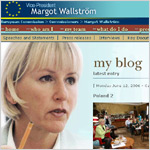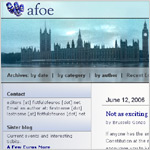But why should the EU care? Such a number of sites means blogging is starting to be big business, so the single market... bla... bla... No! That’s not why the EU should get involved. Blogs are an online conversation, a way to reach out and talk and discuss with people. So if the EU is serious about getting its message out to citizens, it should get serious about blogging.
The old communications dilemmas for the European Union are well known. No EU media, no way for the Commission or European Parliament to get its message across to TV, radio or the newspapers. The early years of the internet were the same; one-to-many broadcasts from the main news providers such as Frankfurter Allgemeine, Le Monde, BBC etc.
Yet things have started to change. The availability of simple and free tools such as Blogger (www.blogger.com) and WordPress (www.wordpress.org) has allowed blogging to become a mainstream business. Add a digital camera and a personal ability to write, and you have all you need to be an amateur journalist. So if the mainstream press are not writing about your area of interest, it is within anyone’s grasp to do something about it and start a blog.

European Commission Vice President Margot Wallström was the first to take the plunge and set up her own blog (weblog.jrc.cec.eu.int/page/wallstrom) and her commitment and devotion to the blogging cause are the yardstick by which all other EU blogs will be judged. Despite an inundation of eurosceptic comments, Wallström has persevered, and over time a picture of a determined and compassionate Commissioner has emerged.
A handful of MEPs have also followed the blogging trend. Former JEF President and MEP in the Socialist Group Richard Corbett is a regular writer (corbett.pir2.info/blog) as is German Liberal Jorgo Chatzimarkakis MEP (chatzi.blogspot.com). Yet Corbett falls into the trap of many MEPs who keep their websites up-to-date: comments are disabled on his blog, preventing the possibility of instantaneous feedback.

Beyond the sphere of elected politicians, an increasingly dense network of comment about EU matters is developing, with the excellent Fistful of Euros (fistfulofeuros.net) leading the way. Brussels Journal (www.brusselsjournal.com) balances this from a eurosceptic perspective. Mainstream media is catching up too, with Mats Engström of Aftonbladet (blogg.aftonbladet.se/1593 - in Swedish) and Mark Mardell of BBC (news.bbc.co.uk - then click ‘Europe’) making the first steps. From the pro-European / federalist side, JEF-France’s Taurillon (www.taurillon.org - mostly in French) and Federal Union’s blog www.federalunion.org.uk/blog are the main contributions to date.
There are of course severe limits to all of this. Not all of the European population has internet access, and a person needs to already know something about EU politics before they will stumble across a blog on the subject. Hence EU politics blogs tend - thus far - to be agglomerations of individuals who already have reasonably fixed positions. Language is a further barrier with a predominance of English and northern European languages so far.
Further, blogging requires effort and commitment, and a determination to overcome ridicule from those commenting on what is written. It’s rough and personal, untested and unknown. It’s not something for those politicians that are content in their ivory tower in Brussels. But it might well be one of the ways to help the EU reach out to the people.


1. On 25 June 2006 at 01:28, by Valéry-Xavier Replying to: Do eu blog?
Replying to: Do eu blog?
Tnank you for this article Jon. I have discovered a few interesting links there !
Let’s just hope that when you write that the Taurillon is “mostly in French”, this will become outdated very soon with the English edition : TheNewFederalist.eu" and our italian edition that readers can now find on this website.
2. On 24 July 2006 at 17:28, by ? Replying to: Do eu blog?
Replying to: Do eu blog?
I agree that more Commissioners and MEPs have to blog - it makes the EU institutions have a more human face.
And blogging in the EU can help europeans come closer together.
But there are problems. 20-odd different EU languages means that any media is going to be limited....
Follow the comments: |
|
